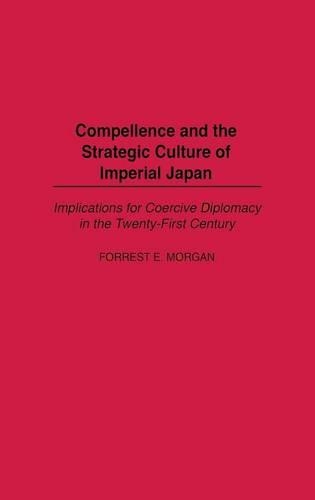
Compellence and the Strategic Culture of Imperial Japan: Implications for Coercive Diplomacy in the Twenty-First Century
(Hardback)
Publishing Details
Compellence and the Strategic Culture of Imperial Japan: Implications for Coercive Diplomacy in the Twenty-First Century
By (Author) Forrest Morgan
Bloomsbury Publishing PLC
Praeger Publishers Inc
30th November 2003
United States
Classifications
General
Non Fiction
320.952
Physical Properties
Hardback
312
Width 156mm, Height 235mm
595g
Description
Compellence is a fundamental tool of international security policy. This study explains how culture shapes the ways that decision-makers respond to the threat of force. First, Morgan builds a theoretical framework, next he analyzes three cases in which states attempted to compel Japan to change its behavior. The first is an in-depth analysis of the 1895 triple intervention in which Russia, Germany, and France forced Japanese leaders to return the Liaotung Peninsula to China following the first Sino-Japanese War. The second and third relate to World War II: the 1941 oil embargo intended to coerce Tokyo to withdraw its military from China and Washington's 1945 efforts to force Japan to end the war. These cases explain much of the seemingly irrational behavior previously attributed to Japanese leaders. Morgan demonstrates that culture clearly influenced outcomes in all three cases by conditioning Japanese perceptions, strategic preferences, and governmental processes. These findings are relevant today, and recent conflicts suggest that they will be increasingly important into the 21st century. This book offers policy makers a much-needed method for employing strategic culture analysis to develop more effective security strategiesstrategies that will be of vital importance in an increasingly volatile world.
Reviews
RAND Corporation policy analyst Morgan examines how culture affected the ways that imperial Japan responded to other nations' coercive threats....Further exploration on the universal applicability of the conclusions in this valuable study of Imperial Japan's strategic decision-making is desirable. Highly recommended. All levels/libraries.-Choice
"RAND Corporation policy analyst Morgan examines how culture affected the ways that imperial Japan responded to other nations' coercive threats....Further exploration on the universal applicability of the conclusions in this valuable study of Imperial Japan's strategic decision-making is desirable. Highly recommended. All levels/libraries."-Choice
Author Bio
FORREST E. MORGAN is a policy analyst for the RAND Corporation. A recently retired Air Force officer, he has held such jobs as commander of a space operations detachment, staff officer at Headquarters Air Force Space Command and Headquarters United States Air Force. He is a graduate of the Air Force's prestigious strategy school, the School of Advanced Air and Space Studies and, after earning a doctorate in policy studies from the University of Maryland, College Park, returned to the SAASS as a member of the faculty.
